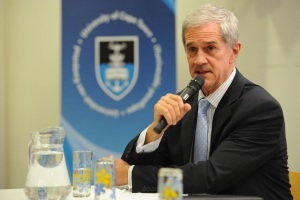Meyer recalls role in SA's democratic transition
30 April 2014 | Story by Newsroom
Former National Party politician Roelf Meyer cites "trust" as one of the defining enablers of South Africa's successful negotiated transition from apartheid to democracy, which was cemented by the first democratic elections in 1994.
Speaking to UCT students and staff in late April, Meyer said that quickly establishing a working relationship with African National Congress (ANC) and former trade union leader Cyril Ramaphosa had been crucial to the process. Meyer and Ramaphosa led the negotiations from the apartheid government and liberation movement's respective camps.
However, what eventually turned out well, did not begin as a bed of roses.
"When we started, we didn't know each other," says Meyer. "But it was more than that. We were actually enemies. We were not necessarily shooting each other or killing each other, but when we started to sit down as opponents at the table, we were enemies.
"Strangely, there was not an enemy-like atmosphere, despite the fact that we were enemies."
Trust was put to the test in the aftermath of the 1992 Boipatong massacre when Ramaphosa appeared on TV alongside the late Nelson Mandela, who declared that negotiations were off as the Nationalist government was not to be trusted.
However, moments later and behind the scenes, recalls Meyer, his telephone rang: it was Ramaphosa, wanting to know when they could resume talks.
Powerful relationship
Of the relationship between Meyer and Ramaphosa, the former defence minister adds: "That relationship between him and I was so powerful that at one stage we developed a line between us that said 'there's not a problem we can't resolve'."
This exemplified the parties' determination to take responsibility for the success of the process, says Meyer, something he sees as central to the success of any process.
Meyer believes another enabler of the negotiated transition was the inherent inclusivity in the process, best demonstrated by Mandela's decision to include Bantustan leaders in the negotiations. This was despite the fact that those leaders were seen as agents of the apartheid system.
Such was Madiba's will not to alienate anyone from negotiations, adds Meyer.
Meyer relates the first time he met with ANC representatives at the Groote Schuur residence in Cape Town in 1990.
"That was the first time I saw Madiba. It was the first time that most of us saw each other together. We were coming together, the two teams, and everybody was introducing themselves."
Meyer was particularly taken by Joe Modise, he says, and the two "couldn't stop talking about each other".
"We wanted to find out more about each other as South Africans."
Switching his attention to the current dispensation, Meyer says South Africa would benefit greatly from an improved education system and sound leadership "on all levels" '“ in politics, civil society, and business.
Personal transformation
Acknowledging that many socio-economic problems have yet to be rooted out, Meyer observed that some improvements had been made: the national economy was now four times bigger than it was in 1994, for instance.
Afterwards the audience questioned Meyer about his personal transformation during his career. How was it possible that he had truly changed his views on the apartheid system?
The response was frank.
"When apartheid laws [were promulgated] in the 1960s, it was to the benefit of my generation, because they were created to empower white Afrikaners. I grew up in a phase when it was worthwhile to be a supporter of apartheid, because I was a beneficiary of it.
"When I was a student like you today, I had no reason to question the policies and the law book."
Meyer said it was only after practising as a lawyer in the 1970s that he was forced to start questioning himself, as well as the laws that he could no longer justify.
"To make a real paradigm shift, to put yourself in a different frame of mind, is not only here,' he said pointing to his head. 'It's not an intellectual activity only. If you don't buy into it, if you are not there emotionally with your full commitment, then it's not a paradigm shift."
That said, Meyer admits that there were forces other than moral conscience at play when the Nationalist government acknowledged the need to dismantle the apartheid system in the 1980s.
Chief among these were the crippling sanctions imposed on SA by the US and UN in particular, as well as the internal revolt led by the United Democratic Front and ANC, all of which left the regime with little choice but to begin the negotiation process.
The discussion marked the beginning of the Students' Representative Council's programme to commemorate two decades of democracy.
Story by Yusuf Omar. Image by Michael Hammond.
 This work is licensed under a Creative Commons Attribution-NoDerivatives 4.0 International License.
This work is licensed under a Creative Commons Attribution-NoDerivatives 4.0 International License.
Please view the republishing articles page for more information.










